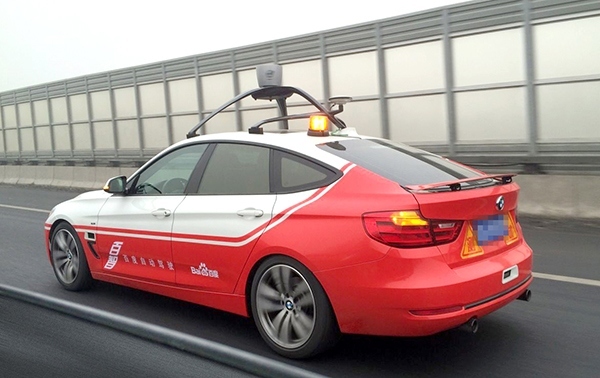

 |
| A Baidu self-driving car (file photo) |
Over 30 Chinese enterprises have established self-driving research centers in San Francisco’s Silicon Valley in the US, forming a complicated network interwoven with both cooperation and competition, Thepaper.cn reported.
Chinese Internet giant Baidu set up its research center in Silicon Valley in 2011, becoming the first Chinese company to do so. Through investments and mergers, the company has laid a solid foundation for the development of its self-driving technology.
Just like Waymo, a self-driving car project under Google, Baidu is developing software and hardware for self-driving technology through the use of geographical data and artificial intelligence.
It launched the Apollo project in April, opening up its self-driving platform to partners. The platform enables carmakers to integrate their software and hardware systems to help them establish their own self-driving systems.
Tencent, another Chinese Internet giant, bought a 5% share in Tesla, becoming the 5th largest shareholder of the company. Tesla is actively developing its self-driving technology and is leading the industry.
Both Chinese tech firms have invested in the Chinese electric vehicle startup NIO, whose self-driving vehicles will hit the US market in 2020. Current market value of NIO is $2.8 billion.
In addition, many e-vehicle companies around Silicon Valley are supported by Chinese capital, including Faraday Future and Lucid. All of them are trying to develop self-driving technologies.
According to the venture capital firm Evangelos Simoudis, located in the US city of Palo Alto, the focus has shifted from California to China. “Chinese enterprises’ reliance on the Silicon Valley is not likely to totally disappear, but it will be decreased with these companies’ growing abilities,” the company said.
However, the mobility of highly skilled professionals in the industry is fast. Baidu’s chief scientist Andrew Ng, for example, resigned in March, followed by Wang Jin, the company’s senior vice president.
“Competition is fierce,” said Wang Jing’ao, head of Baidu’s self-driving program in Silicon Valley, adding that talent shortage is always an issue.
 Fire brigade in Shanghai holds group wedding
Fire brigade in Shanghai holds group wedding Tourists enjoy ice sculptures in Datan Town, north China
Tourists enjoy ice sculptures in Datan Town, north China Sunset scenery of Dayan Pagoda in Xi'an
Sunset scenery of Dayan Pagoda in Xi'an Tourists have fun at scenic spot in Nanlong Town, NW China
Tourists have fun at scenic spot in Nanlong Town, NW China Harbin attracts tourists by making best use of ice in winter
Harbin attracts tourists by making best use of ice in winter In pics: FIS Alpine Ski Women's World Cup Slalom
In pics: FIS Alpine Ski Women's World Cup Slalom Black-necked cranes rest at reservoir in Lhunzhub County, Lhasa
Black-necked cranes rest at reservoir in Lhunzhub County, Lhasa China's FAST telescope will be available to foreign scientists in April
China's FAST telescope will be available to foreign scientists in April "She power" plays indispensable role in poverty alleviation
"She power" plays indispensable role in poverty alleviation Top 10 world news events of People's Daily in 2020
Top 10 world news events of People's Daily in 2020 Top 10 China news events of People's Daily in 2020
Top 10 China news events of People's Daily in 2020 Top 10 media buzzwords of 2020
Top 10 media buzzwords of 2020 Year-ender:10 major tourism stories of 2020
Year-ender:10 major tourism stories of 2020 No interference in Venezuelan issues
No interference in Venezuelan issues
 Biz prepares for trade spat
Biz prepares for trade spat
 Broadcasting Continent
Broadcasting Continent Australia wins Chinese CEOs as US loses
Australia wins Chinese CEOs as US loses